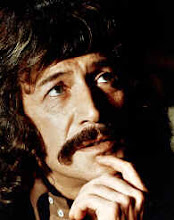A student card may not be a badge of honour, but it has to be said that it comes in mighty useful - getting a £44 stalls seat for a tenner is not to be sniffed at and makes you wonder what these rioting types are moaning about. Ooo a bit of politics creeping in there, sorry folks!
The play in question was the appropriately timed Season's Greetings at the National. First time I'd ever been there, and the hideous 70s lump of concrete that is the outside of the building conceals a roomy, modern venue; albeit one that flogs skimpy salmon sandwiches at tourist rip-off prices.
I'd seen Alan Ayckbourn's other recent revival of The Norman Conquests a year or two ago and found its middle-class tweeness a bit dated, but Season's Greetings, perhaps because it is deliberately set in the era of the play's original production (early 80s), holds up rather better. The comic story of a highly dysfunctional family Christmas, it boasts an excellent cast and I couldn't help get something of a Doctor Who-ey vibe from an opening scene which features Catherine Tate (new series ex-companion), Mark Gatiss (New Who writer, actor and geek) and David Troughton (son of Patrick).
These three actors have perhaps the most memorable roles; Tate, surprisingly attractive in the flesh, is the disappointed wife to Neil Stuke's electronics obsessive and flirts manically with the dashing young author who becomes an unexpected Christmas guest; Gatiss, one of Britain's most (over)exposed talents with credits this year on Doctor Who, Sherlock, First Men in the Moon, and his excellent History of Horror documentary, is the ineffectual Bernard whose appallingly dull puppet show is the comic highlight of the play; and Troughton is the somewhat deranged Uncle Harvey, who keeps a bone-handled throwing knife in his sock and has an unhealthy obsession with TV violence.
The holiday develops into assorted mayhem mainly revolving around aforementioned young author, played by Oliver Chris, an actor whose name always seems to be the wrong way round. The only thing that jarred with me is that the family children are never seen. It might have added a certain poignancy to contrast the kids' innocent enjoyment of Christmas with the adults' jaded, alcohol-fuelled antics.
Subscribe to:
Post Comments (Atom)

No comments:
Post a Comment